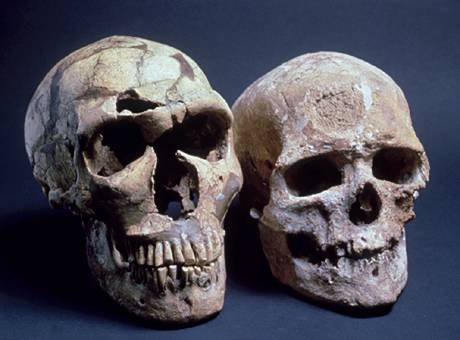Posted: Sun Jan 08, 2006 11:48 am
i have been saying that morality is completely subjective, but only because we have our own definition. morality stems from a common human adaptation that we are able to survive better in groups. this is a very easy thing to figure out, that is why it is similar across the world. common morality is based on what is good for the whole (the whole being whatever culture the individual belongs to). individual morality varies from person to person, but the majority has this common idea that we must work as a community. there are those who are more prone to primal thoughts, or altogether unique thoughts--this is the nature of evolution.Wall-dog wrote:One of the problems in the argument against morality is that the argument is empirically flawed. If morality were a creation of Mankind then morality would differ dramatically from place to place and from culture to culture and would grow stronger as civilizations grow and our needs to interact increase. empirically however the opposite is true. Read a little about the birth and growth of civilization - Will Durant's 'The Story of Civilization' series is a good starting point. The first 100 pages of Book One, Our Oriental Heritage should be required reading.
It is fact that every civilization from the dawn of time has had almost exactly the same sense of morality. Variations are minimal and are easy to explain. Furthermore, it has been the case in every civilization that morality weakens as civilizations grow (leading to the fall of civilization).
The fact that morality is universal smacks of God, as does the fact that we become less moral as a peoples rather than more when civilizations grow.
What I'd like to know is, if we are an evolved species, where is the fossil evidence? It is ALSO a fact that archeologists have yet to find a single human or 'pre-human' fossil that does not fit modern man. Darwinists have created 'pre-human' skeletons by being creative with how they fit 'bone fragments' together.
Darwin only took micro-evolution as fact. By his own admission, his theories would have to be discarded if fossil evidence supporting it is not found.
Let me put it this way. Darwinism demands that all species are in a continual flux. Everything is continuously evolving, thus every 'species' is really a pre-species of another species. We are, according to Darwin, but a link between a previous pre-human type and a future human type (who will call us pre-human). This being the case, 100% of all fossil remains by definition are transitionary in nature and the VAST majority of fossils should be forms of species prior to modern forms. Yet no such fossils have ever been found with the possible exception of an animal Darwinists claim to be a common ancestor to both whales and hippos. Is it a common ancestor, a separate species altogether (and now extinct), or a fabrication? There is no reason to believe that it is a common ancestor other than that it appears to share some characteristics with both. How many shared characteristics? I could find just as many shared characteristics between my pet dog, a hippo, and myself. Does this make my dachshund a shared ancestor too?
The problem with modern science is that modern scientists have thrown out the scientific method and replaced it with a 'rule' that all things must have a natural cause. In other words, 'Science' starts with an assumption that God does not exist. Arguments against Intelligent Design start with the statement that Intelligent Design can't be scientific because it doesn't gel with the 'rule of science' that all things have naturalistic causes. But the statement that all things have naturalist causes is a THEORY rather than a fact. Saying that one can't use God as a legitimate scientific theory goes against the very nature of science - that only things PROVEN are accepted as fact. I find it particularly ironic that the arguments used to keep Intelligent Design outside the realm of science are exactly the same arguments the Catholic Church used to throw Gallelleo into jail.
there is so little fossil evidence because of the nature of the creation of fossils. fossil remains are so rare that we only find maybe a percent or two of the total number of organisms that ever existed. we will never find the fossils you are looking for, whether they existed or not.
your theories of the flaws of evolution are based in misunderstanding of how scientific processes work. you call evolutionists darwinists, when in fact many evolutionists disagree with a lot of darwin's claims. the fact is, darwin found a pattern in how organisms adapt to their environment through natural selection. genes are diversified through reproduction, and most of them die through natural selection. the ones that are able to survive long enough to pass on their genes are the transitional species.
the reason the fossils we find are not apparently forms of modern species is because of two major reasons:
1) because most of the organisms that have existed on this planet have gone extinct, and so have their genes. they lived back then, but their lines died out and so there are no descendants today.
2) most of the organisms that lived and died on this planet do not leave behind fossil remains. as i have stated, fossils are so rarely formed, that they cannot be used as evidence against evolution (unless a direct contradiction is found).
the problem with creationists is that they do not see natural cause as the work of god. science is only the observation of what exists. there are some who are not competent enough to make proper conclusions based on those observations, yet they still do; but in the long run, mistakes are usually weeded out. science is an ongoing study, forever correcting itself rather than bathing in absolutes.
